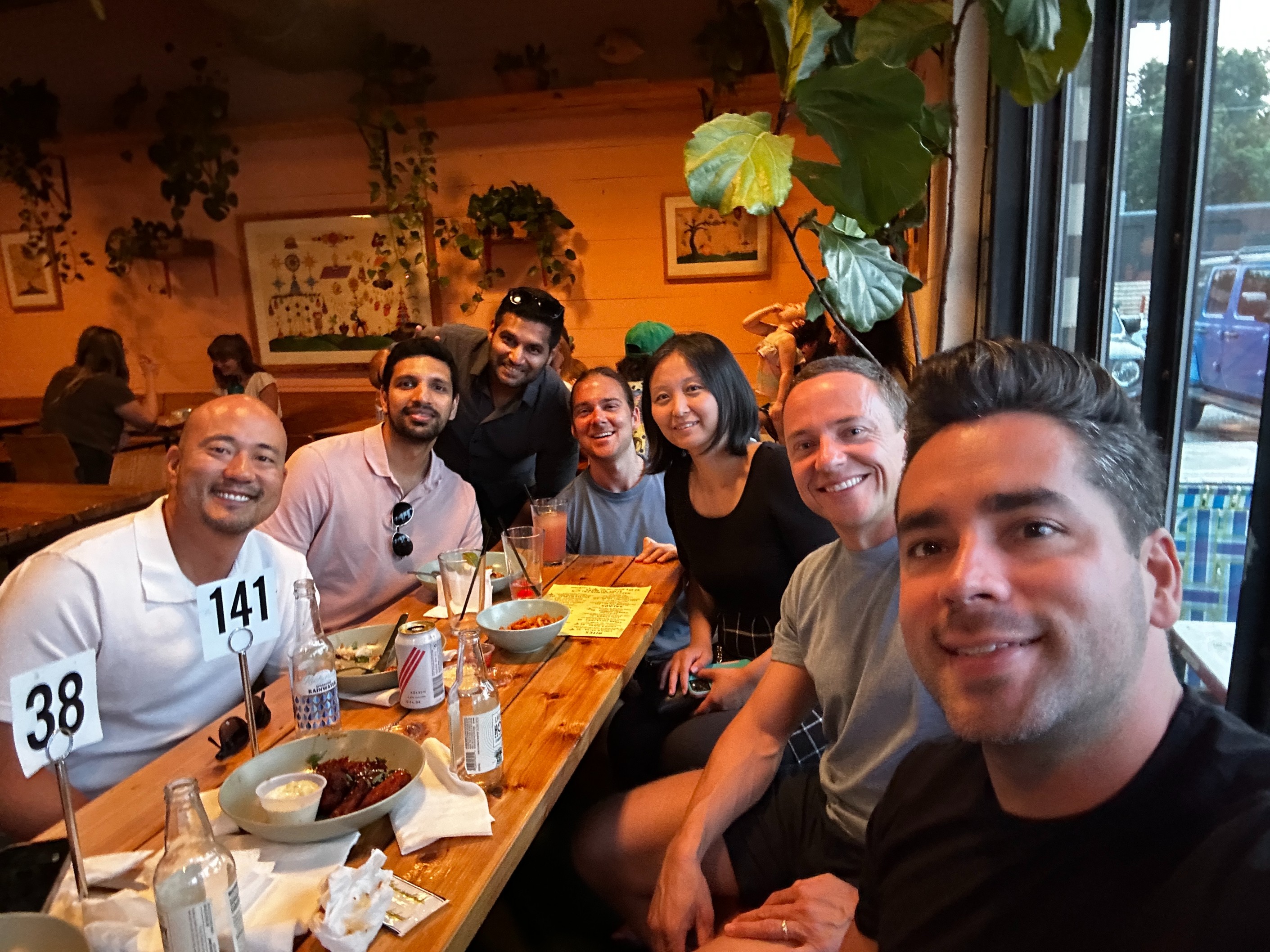Daniel Ek Investments: What Spotify's Founder Teaches Us About Betting on Infrastructure
.png)
Brian Nichols is the co-founder of Angel Squad, a community where you’ll learn how to angel invest and get a chance to invest as little as $1k into Hustle Fund's top performing early-stage startups.
When most people think about Daniel Ek, they picture Spotify. The Swedish entrepreneur who convinced the world to stop pirating music and start streaming it instead. But if you dig into Daniel Ek investments beyond Spotify, you'll find a fascinating pattern that every early-stage investor should pay attention to.
Daniel isn't just throwing money at random startups. He's building a portfolio around a specific thesis, and it's one that's paying off big time.
Who is Daniel Ek?
Before we get into his investment approach, let's set the stage. Daniel co-founded Spotify in 2006 with Martin Lorentzon. Today, Spotify has over 600 million users and is valued at around $70 billion. Not too shabby for a company that everyone said would never work because the music labels would kill it.
But here's what makes Daniel interesting as an investor: he started making investments while still running Spotify. In 2016, he launched Prima Materia, his investment vehicle, with €1 billion of his own money. That's billion with a B.
Most successful founders wait until they exit their company before becoming serious investors. Daniel started while he was still in the thick of scaling Spotify. That gives him a unique perspective that shows up in how he picks companies.
What's Daniel Ek's investment thesis?
After tracking Daniel Ek investments for a while, a clear pattern emerges. He's focused on three main areas:
Deep tech and infrastructure: Companies building the foundational technologies that other companies will depend on. Think AI, quantum computing, and advanced materials.
Healthcare technology: Particularly companies using AI and data to improve diagnostics and treatment. He's invested in companies like Neko Health, which is building full-body health scanning technology.
Climate and sustainability: Not the sexy consumer-facing stuff, but the hard infrastructure problems. Carbon capture, battery technology, sustainable materials.
Notice what's missing? Consumer apps. Social media platforms. The next TikTok clone. Daniel isn't chasing trends or trying to pick the next viral product.
He's betting on infrastructure. The boring stuff that makes the cool stuff possible.
Why infrastructure investments matter
Here's something most angel investors miss: infrastructure companies are harder to build, take longer to scale, but create more defensible moats.
When you invest in a consumer app, you're betting on growth hacking, viral loops, and staying ahead of changing consumer preferences. That's exhausting and unpredictable.
When you invest in infrastructure, you're betting on technical excellence and network effects. Once other companies depend on your technology, they're not switching unless something dramatically better comes along.
Look at Spotify itself. It's infrastructure for the music industry. Once labels, artists, and listeners all adopted it, the switching costs became massive. That's the kind of moat Daniel understands deeply.

Real examples from Daniel Ek's portfolio
Let's look at some actual Daniel Ek investments and what they tell us:
Neko Health: This is Daniel's most public investment. He co-founded it with Hjalmar Nilsonne. They're building technology for full-body health scans that can detect diseases early. The first clinic opened in Stockholm in 2023.
This isn't a healthcare app. It's hardware and AI working together to solve a real problem: most people don't get comprehensive health screenings until something goes wrong.
Cervest: A climate intelligence platform using AI to assess climate risk. Companies and governments use it to understand how climate change will affect their operations and investments.
Again, not sexy. But incredibly valuable to the organizations that need it.
Einride: Autonomous electric freight vehicles. They're not building consumer electric cars. They're building the infrastructure for sustainable freight transportation.
See the pattern? Daniel is investing in the picks and shovels, not the gold rush.

What makes Daniel's approach different?
Most VCs talk about investing in infrastructure, but then they chase the latest consumer trend when valuations get frothy. Daniel stays disciplined.
He invests for decades, not exits: Daniel has said publicly that he's thinking about Prima Materia as a 100-year project. He's not looking to flip companies in 5-7 years. This changes everything about how you evaluate deals.
He's comfortable with hard tech: Most early-stage investors avoid deep tech because it's hard to evaluate and takes forever to commercialize. Daniel leans into it. He has the capital and patience to wait for these companies to mature.
He leverages his Spotify experience: Building Spotify taught Daniel what it takes to change entire industries. He's not intimidated by big, hairy problems that require dealing with regulators, incumbents, and skeptical customers.
What can early-stage investors learn from this?
Okay, so most of us don't have €1 billion to invest in quantum computing startups. But Daniel Ek's approach has lessons that apply at any check size.
1. Develop conviction about macro trends
Daniel isn't investing in random infrastructure companies. He has strong beliefs about where the world is going:
- Healthcare will become more preventative and data-driven
- Climate change will require massive infrastructure investments
- AI will transform how we solve complex problems
These aren't hot takes. They're well-reasoned bets on long-term trends. As early-stage investors, we should be developing similar conviction about where our industries are headed.
2. Look for companies solving hard problems
Easy problems attract lots of competition. Hard problems keep most founders away. If you can identify founders who are capable of solving genuinely difficult technical or market problems, you're finding companies with natural moats.
When we're evaluating deals, we should ask: "Is this actually hard to build? Or could any competent team replicate this in six months?"
3. Think about dependencies, not just markets
Daniel invests in companies that other companies will depend on. That's a powerful filter.
Instead of asking "How big is the market?" ask "Who will depend on this technology? And how hard would it be for them to switch once they're using it?"
Companies with strong dependency moats can charge more, retain customers longer, and expand more predictably.
4. Be patient with commercialization timelines
Infrastructure companies take longer to scale than consumer apps. That's just reality. If you're not comfortable with 10+ year timelines, stick to faster-moving categories.
But if you can be patient, the payoffs can be enormous. Stripe took years to reach its current scale. So did Twilio. So did most infrastructure companies that became massive outcomes.
Should you copy Daniel's strategy?
Probably not exactly. Unless you have hundreds of millions to deploy and can wait decades for returns, you'll need to adapt his approach to your situation.
But the principles are sound:
- Invest in categories where you have genuine expertise
- Look for companies solving hard problems that create dependency moats
- Be patient with commercialization timelines
- Develop conviction about long-term macro trends
If you're an operator turned angel investor who wants to back technical founders solving real problems, Angel Squad connects you with other investors who share that philosophy. We focus on finding companies building genuine value, not just chasing the latest hype cycle.
The bottom line for angel investors
Daniel Ek's success with Spotify wasn't luck. It was the result of understanding what it takes to build infrastructure for an entire industry. His investment strategy reflects that same understanding.
The key lessons:
- Infrastructure compounds differently than consumer products
- Hard problems create natural moats
- Dependencies are more powerful than market size alone
- Patience matters more than most investors realize
- Technical depth beats trend-chasing
Most importantly, Daniel invests in areas where he has genuine expertise and conviction. He's not trying to be an expert in everything. He's doubling down on what he knows.
That's something every investor can learn from, whether you're writing billion-dollar checks or getting started with your first few angel investments.













